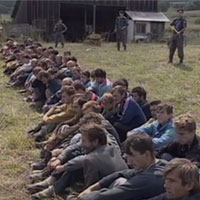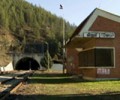European Court of Human Rights Rejects the Application of Former Prisoners of Šljivovica and Mitrovo Polje Detention Camps: Amnesty for the Prosecution, Disillusionment for Victims

On 27 October 2016, the European Court of Human Rights (ECtHR) rejected the application lodged on behalf of 67 Bosniaks, who during 1995 and 1996 were detained in the Šljivovica and Mitrovo Polje camps in Serbia, and consequently refused to determine whether the investigation of Serbian government bodies into their ill-treatment was adequate. The Humanitarian Law Center (HLC), who represented the former detainees in this case, considers that this decision of the ECtHR leaves thousands of victims of yet unprosecuted crimes without protection and offers the Serbian judiciary an excuse for their current and future inactivity when it comes to war crimes prosecution.
Criminal Complaint and Constitutional Complaint
In September 2011, the HLC lodged a criminal complaint with the Office of the War Crimes Prosecutor (OWCP) against 14 identified and several dozen as yet unidentified members of the Yugoslav Army (VJ), Serbian Police (MUP) and Serbian State Security Agency, for war crimes committed in the Šljivovica and Mitrovo Polje detention camps in the period between the end of July 1995 and 10 April 1996. In the complaint, the HLC provided statements of about 70 former detainees, survivors of torture and inhumane treatment, and proposed that the OWCP examine them as witnesses.
On 8 March 2013, the OWCP found that “there were no grounds for initiating criminal prosecution against the alleged perpetrators, as the complaint itself and all subsequently gathered information and actions undertaken indicated that in their acts there were no elements of a war crime against prisoners of war or any other crime under the jurisdiction of this prosecutors’ office“.
After a subsequent verification, the HLC found out that none of the proposed witnesses were ever contacted by the OWCP, which indicates that the OWCP failed to conduct a thorough, independent and effective investigation, thus failing to meet its obligations under the European Convention for the Protection of Human Rights and Fundamental Freedoms (the Convention).
For that reason, the HLC on 4 April 2013 lodged a constitutional complaint with the Constitutional Court on behalf of the former detainees. On 27 June 2014, the Constitutional Court rejected the complaint, finding that the decision of the OWCP was not a type of act which adjudicates on the rights and obligations of the appellants and, consequently, the Constitutional Court does not have jurisdiction.
Having exhausted all domestic remedies, the HLC on 24 December 2014 submitted an application with the ECtHR against the Republic of Serbia. The Government of Bosnia and Herzegovina has also provided its opinion on the matter, as the applicants are its citizens.
Decision of the ECtHR
Although both parties submitted a large amount of argumentation and evidence regarding the key issue – whether the investigation the OWCP conducted into the criminal complaint was or was not effective – the ECtHR did not address this issue, but held that the parties applied for the protection of their Convention rights too late. Namely, the Convention imposes an obligation on persons whose Convention rights have been violated to react promptly by bringing complaints that are available to them, first in the state responsible for the violation, and then with the ECtHR. Even though the HLC submitted its application within the prescribed time limit of six months following the ruling of the Constitutional Court, the ECtHR concluded that, as sixteen years had passed since the events in question and the lodging of the criminal complaint, the applicants’ application was out of time.
The ECtHR held that the victims of crimes in the Šljivovica and Mitrovo Polje detention camps ought to have known that the OWCP would not prosecute the crimes referred to in their complaint. This leads to the conclusion that the six-month time limit for applying to the ECtHR in the instant case did not run from the date on which the last available domestic remedy was exhausted, which in the case of Serbia was the ruling of the Constitutional Court, but from the moment when the victims became aware that the OWCP would not investigate into what happened to them. That moment came, in the ECtHR’s view, somewhere between 2006 and 2010, when the Serbian judiciary was delivering final judgments in which the conflict in Bosnia and Herzegovina was not being qualified as an international armed conflict. This, according to the ECtHR, should have signalled to the Bosniak victims from the Serbian camps, and to the HLC, as their representative, that the OWCP would not take steps with regard to their case because supposedly the Geneva Conventions did not apply to it, and therefore the acts referred to in their complaint would not be classified by the OWCP as a war crime. This reasoning is unfathomable, from both legal and logical points of view:
First and foremost, because the facts on which the ECtHR based its conclusion are simply untrue. The ECtHR concludes that the consistent practice of the OWCP, from the beginning of its operation, was to treat the war in Bosnia and Herzegovina (B&H) as an internal armed conflict, therefore the applicants ought to have known that, given such a practice, the OWCP would not act upon their complaint. However, it is not true that there has been a consistent practice in Serbia of treating the war in B&H as an internal conflict. Namely the indictment in the Tuzla Convoy Case qualified the war in B&H as an international conflict, and the judgment in this case became final only in December 2015.
Moreover, in its decision the ECtHR does not address at all the fact that, in rejecting the criminal complaint, the OWCP stated, without any rationale, that in the alleged acts “there are no elements of a war crime against prisoners of war or any other crime under the jurisdiction of this prosecutor’s office”. This general formulation used by the OWCP implies that it had not found any grounds for initiating prosecution for a crime against humanity either, the elements of which are contained in the acts complained of, and which crime does not require the context of an armed conflict, let alone of any particular character. Yet, the ECtHR in its decision only mentions war crimes. However, even if the ECtHR had addressed crimes against humanity, the outcome of the case would have definitely been the same, because the OWCP has never filed an indictment for this crime, despite being obliged under international law to do so. Even though the Court expressly stated that it left aside the question of whether or not the OWCP’s interpretation of international law is correct, by failing to take into account all aspects of the case, it has in effect granted amnesty to the OWCP for its failure to apply international law.
Lastly, the OWCP currently has a backlog of more than 800 pending cases; for over 10 years, it has been announcing indictments for the most severe crimes under its jurisdiction, without ever filing them. The European Commission, the Council of Europe Commissioner for Human Rights, the OSCE, the UN Committee on Enforced Disappearances and other UN committees have repeatedly noted the inertia on the part of the OWCP. This is the reality of war crimes prosecution in Serbia. Had the ECtHR admitted the application, it would have helped to open investigation into the crimes committed in the Šljivovica and Mitrovo Polje camps and speeded up trials in numerous other cases. Instead, the Court in effect approved the decade-long inactivity of the OWCP, and laid the responsibility for the absence of war crimes prosecutions on the victims. Furthermore, the court departed from its own case law, according to which in cases where state authorities know that a serious crime has been committed, the obligation to launch an investigation rests primarily with them (see, for example, İlhan v. Turkey). Although Serbian state authorities knew of the existence of the Šljivovica and Mitrovo Polje camps (because they themselves established them) and knew that prisoners in these camps were treated inhumanely, which resulted in a number of deaths (the evidence of which was submitted to the Court), it turns out, according to the decision of the ECtHR, that responsibility for launching criminal proceedings rests entirely with the victims.
There can be no doubt that the ECtHR’s decision regarding the HLC’s complaint relating to the Šljivovica and Mitrovo Polje detention camps will further weaken the chances of the victims of crimes committed in those camps of obtaining justice from the Serbian judiciary. But it may also have some even more far-reaching effects, as it offers an excuse for the OWCP to remain inactive in numerous other cases, and shifts responsibility for the lack of investigation onto the victims and their representatives. In this way, this latest decision of the ECtHR will further undermine the already slow process of war crimes prosecution in Serbia, and thus put at risk the right to truth of thousands of victims of crimes that have not yet been prosecuted by the OWCP.
Facts about the camps and ill-treatment
When Žepa (a UN safe area in Bosnia) was captured by the army of Bosnian Serbs on 27 July 1995, a group of local Bosniaks, including members of the Army of BiH, civilians and minors, crossed the Drina River on makeshift rafts and entered Serbia. Between 31 July and 10 August 1995, approximately 800 Bosniaks, in several groups, crossed to the right bank of the Drina River and surrendered to the Army of the Federal Republic of Yugoslavia. Yugoslav border guards arrested them and took them to the border outpost in the village of Jagoštica. Along the way, they cursed and threatened them and beat them with rifle butts. In Jagoštica, the Bosniaks were listed and then taken by trucks to a makeshift camp in Šljivovica (in the municipality of Čajetina). During the ride, one Bosniak suffocated owing to the lack of oxygen in an overcrowded truck. When they arrived in Šljivovica, the Bosniaks were handed over to members of the Užice Police Department. A few days later, around 450 men from Žepa were transferred from Šljivovica to another camp, located in Mitrovo Polje, near Aleksandrovac. The living conditions, food, and treatment of prisoners by guards were the same in both camps. The detainees were beaten and tortured on a daily basis and deprived of food and sleep. In both camps, a group of men, believed to be members of the command of the Army of B&H, were held in isolation, beaten on a daily basis and interrogated about their role in the Army of B&H. Several men were sexually abused. The only female among them, who was held for a short while in the camp in Mirovo Polje, was sexually abused by a policeman from Brus police station. Following a UNHCR intervention, the detainees were repatriated or sent to third countries during the first half of 1996, after which both camps were closed.







